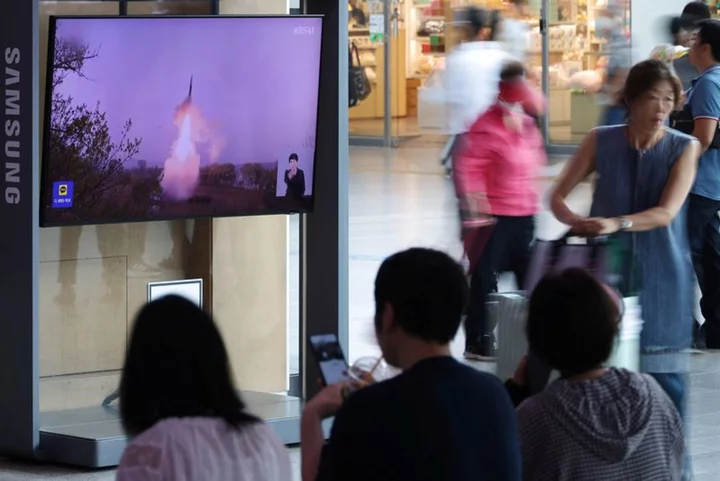By Josh Smith and Kantaro Komiya
SEOUL/TOKYO (Reuters) -North Korea conducted a missile test with its longest ever flight time off its east coast on Wednesday, as leaders of South Korea and Japan were set to meet on the sidelines of a NATO summit to discuss threats including the nuclear-armed North.
The launch came after heated complaints from North Korea in recent days, accusing American spy planes of violating airspace in its economic zones, condemning a recent visit to South Korea by an American nuclear-powered cruise missile submarine, and promising to take steps in reaction.
The missile flew for 74 minutes to an altitude of 6,000 km and range of 1,000 km, Japan's chief cabinet secretary Hirokazu Matusno said, in what would be the longest ever flight time for a North Korean missile.
In April North Korea test fired its first ever solid-fuel intercontinental ballistic missile (ICBM), one of around a dozen missile tests this year. Analysts believe the North's ICBMs can fly are enough to strike targets anywhere in the United States, and the country likely has developed nuclear warheads that can fit on rockets.
Japan's Coast Guard said what was believed to be a ballistic missile appeared to have landed as of mid-morning. It had earlier predicted the projectile would fall outside Japan's EEZ and around 550 km (340 miles) east of the Korean peninsula.
Leif-Eric Easley, an international studies professor at Ewha Womans University in Seoul, said North Korea's recent bellicose statements against U.S. surveillance aircraft was part of a pattern of inflating external threats to rally domestic support and justify weapons tests.
"Pyongyang also times its shows of force to disrupt what it perceives as diplomatic coordination against it, in this case, South Korea and Japan’s leaders meeting during the NATO summit."
South Korean President Yoon Suk Yeol, in Lithuania to attend the NATO summit, convened an emergency national security council meeting to discuss the launch and vowed to use the summit to call for strong international solidarity to confront such threats.
Japanese Prime Minister Fumio Kishida, who is also in Lithuania, ordered his staff to gather information and stay alert to prepare for unpredicted events, according to the prime minister's office.
Kishida and Yoon are expected to meet on Wednesday, and Matsuno said a summit was also planned with South Korea, Australia and New Zealand.
"We will respond in close cooperation with the international community," Matsuno told a news conference.
He said the launch threatened the peace and stability both of the region and the international community, and that Japan had lodged a protest through diplomatic channels in Beijing.
FLURRY OF ACTIVITY
The United States' top general met with his South Korean and Japanese counterparts for a rare trilateral meeting in Hawaii just before the missile launch.
With a wary eye on North Korea's military moves and other rising challenges in the region, Yoon has moved to repair frayed ties with Japan and reduce historical disputes that have limited cooperation between the two U.S. allies.
In addition to its missile tests, the North failed in an attempt to launch its first-ever spy satellite on a new launch vehicle. United Nations Security Council resolutions ban North Korea's use of ballistic missile technology, including for satellite launches.
The Security Council, as well as a number of nations, have imposed sanction on North Korea for its missile and nuclear weapons programmes.
(Reporting by Tokyo and Seoul bureaus; writing by Elaine Lies; Editing by Tom Hogue and Lincoln Feast)

